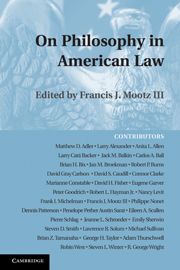Book contents
- Frontmatter
- Contents
- Introduction
- PART I KARL LLEWELLYN AND THE COURSE OF PHILOSOPHY IN AMERICAN LAW
- 1 On Philosophy in American Law (1934)
- 2 Law in Life, Life in Law: Llewellyn's Legal Realism Revisited
- 3 On Realism's Own “Hangover” of Natural Law Philosophy: Llewellyn Avec Dooyeweerd
- 4 On the Instrumental View of Law in American Legal Culture
- 5 When Things Went Terribly, Terribly Wrong
- 6 The Mechanics of Perfection: Philosophy, Theology, and the Foundations of American Law
- PART II PHILOSOPHICAL PERSPECTIVES ON LAW
- PART III AREAS OF PHILOSOPHY AND THEIR RELATIONSHIP TO LAW
- PART IV PHILOSOPHICAL EXAMINATIONS OF LEGAL ISSUES
- PART V LAW, RHETORIC, AND PRACTICE THEORY
- PART VI QUESTIONING THE RELATIONSHIP BETWEEN PHILOSOPHY AND AMERICAN LAW
- PART VII COMMENTARIES
- Contributors and Selected Bibliography
- Name Index
- References
5 - When Things Went Terribly, Terribly Wrong
Published online by Cambridge University Press: 31 July 2009
- Frontmatter
- Contents
- Introduction
- PART I KARL LLEWELLYN AND THE COURSE OF PHILOSOPHY IN AMERICAN LAW
- 1 On Philosophy in American Law (1934)
- 2 Law in Life, Life in Law: Llewellyn's Legal Realism Revisited
- 3 On Realism's Own “Hangover” of Natural Law Philosophy: Llewellyn Avec Dooyeweerd
- 4 On the Instrumental View of Law in American Legal Culture
- 5 When Things Went Terribly, Terribly Wrong
- 6 The Mechanics of Perfection: Philosophy, Theology, and the Foundations of American Law
- PART II PHILOSOPHICAL PERSPECTIVES ON LAW
- PART III AREAS OF PHILOSOPHY AND THEIR RELATIONSHIP TO LAW
- PART IV PHILOSOPHICAL EXAMINATIONS OF LEGAL ISSUES
- PART V LAW, RHETORIC, AND PRACTICE THEORY
- PART VI QUESTIONING THE RELATIONSHIP BETWEEN PHILOSOPHY AND AMERICAN LAW
- PART VII COMMENTARIES
- Contributors and Selected Bibliography
- Name Index
- References
Summary
It is the kind of thing that, like aging, catches you unawares even as it happens in plain sight. You look up and the landscape of your face, your town, your profession has changed. One minute everyone is talking about paradigm shifts and the next thing you know they're back practicing phrenology (Schlag 1997). I remember the moment when the realization struck. It was the mid-1990s. A colleague on appointments asked me to read a manuscript forthcoming in one of the top journals. The committee was interested in the author as a potential lateral and wanted to move before the market got hot. The piece, something on criminal procedure written from a liberal perspective, was one I would naturally be sympathetic to. Halfway through I stopped in disbelief. It wasn't that the argument was wrong so much as that there was none: The piece exemplified Llewellyn's admonition: “Doctrine brittle and neat is the tool of tender minds in pursuit of policy that can be embraced without using one's intellect” (Twining 1973:116). Who, I wondered as I checked the proud citation on the first page, is publishing this? “Oh, right, Harvard.” I later recounted the incident over lunch with a friend known for his efforts to reshape the academy in more intellectual directions. “When I entered the academy ten years ago, you could pick up any of the top law reviews and always find some really interesting piece on Hegel, deconstruction, or literary theory.
- Type
- Chapter
- Information
- On Philosophy in American Law , pp. 35 - 43Publisher: Cambridge University PressPrint publication year: 2009
References
- 1
- Cited by

